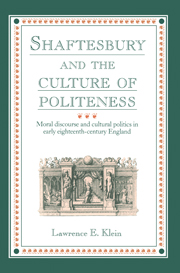 Shaftesbury and the Culture of Politeness
Shaftesbury and the Culture of Politeness 10 - The culture of liberty
Published online by Cambridge University Press: 13 March 2010
Summary
“Politeness”
Shaftesbury may have had qualms about the links between Whiggism and the Court after 1688, but polemics in Queen Anne's reign demanded simplicity. Thus, in his published writings, the Whigs were, simply, the party of liberty, the party that made the 1688 Revolution and opposed the French, the Stuart tyrants, and the High Churchmen. While Shaftesbury identified political liberty with post-1688 political arrangements, he was largely concerned with what we can identify, variously, as cultural, intellectual and, especially, discursive liberty. Thus, for Shaftesbury, liberty was the condition for full human development: “Tis Liberty indeed that can only polish & refine the Spirit & Soul as well as Witt of Man.” Such liberty operated in the related fields of discourse and politics, “Freedome of Reason in the learnd world, & Good Government & Liberty in the civil world.” Since the Church and the Court dominated discourse in unhealthy ways, assuming magisterial or awing postures that promoted their political authority at the expense of individual autonomy, Shaftesbury urgently and repetitively asserted the importance of discursive liberty. Having examined how Shaftesbury mounted a critique of the Church and the Court in psychosocial and discursive terms, we can turn to the positive side of the argument, the promise of Whig political hegemony to initiate a distinctive and flourishing age in British culture.
Shaftesbury sketched his program in a letter of 1706, anticipating that the ultimate victory of Britain over France would lead to a great advance in “Letters and Knowledge.”
- Type
- Chapter
- Information
- Shaftesbury and the Culture of PolitenessMoral Discourse and Cultural Politics in Early Eighteenth-Century England, pp. 195 - 212Publisher: Cambridge University PressPrint publication year: 1994


